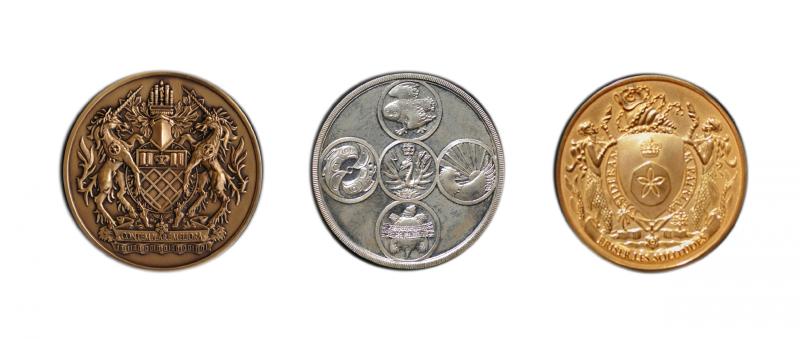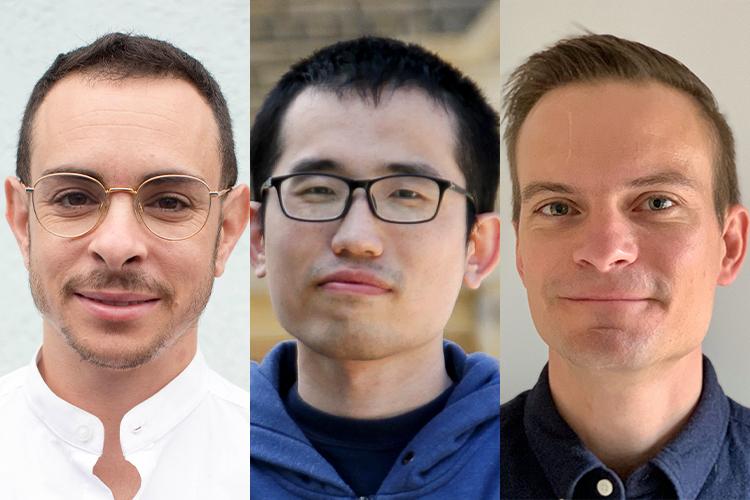June 14, 2021 | Volunteer & Awards
Three U of T alumni awarded Governor General’s gold medals

Former University of Toronto graduate students Ido Katri (LLM 2015, SJD 2021), Kieran Quinn (MSc 2008), and Mingyang Wei (PhD 2020) have been awarded the prestigious Governor General’s Gold Medal for academic excellence.
The medal, awarded each year to three students determined to have the highest academic standing, is one of the highest honours reserved for graduate students in Canada. Candidates are evaluated on the basis of their performance in degree courses, the merit of their thesis and its defense, and the originality and importance of their research.

Ido Katri (Faculty of Law)
When asked what drives his work on trans rights, 2020-2021 Governor General’s gold medal winner Ido Katri (LLM 2015) has a simple enough answer. “I believe in research that dares to create change.”
I believe in research that dares to create change
A longtime advocate for trans rights in Israel/Palestine, Katri arrived at the University of Toronto in 2014 with a decade’s worth of experience in legal advocacy. As a young law student, he had seen firsthand “the enormous gap in trans lived experiences between how the law looks ‘on the books’ and how it functions in daily life.” Concerned by the lack of research on the topic, Katri began to do the work himself. But as the first out trans jurist in the country, he found he didn’t have the institutional support or intellectual community he needed to further his work.
Katri found what he was looking for at U of T, where he earned his SJD from the Faculty of Law under the supervision of Professor Brenda Cossman. His dissertation explored what has come to be known as gender self-determination, i.e. laws and policies that allow for the reclassification of sex based on self-identification of gender.
“I examine sex reclassification policies on a global scale to show the rise of a right to gender identity,” explains Katri. “Yet, as an individual right, gender identity fails to address systemic harms and inevitably redraws the public/private divide along the contours of the trans body. Looking at the limits of gender identity as a legal right, I use critical race-, queer-, trans- and post-colonial theories to offer new imaginaries for trans legal engagements.“
Receiving this award reminds me that excellence in research requires that I keep listening to heartbeats—my own and those of the people whose lives my research aims to change
Katri says Prof. Cossman not only encouraged him to pursue what was an interdisciplinary and “untypical” dissertation but also helped him create institutional and intellectual networks of support.
“My supervisor taught me not only to open my thoughts against my own persuasions but to believe in my work and its impact,” reminisces Katri. “I have been shaped as a scholar through our endless conversations about theory and practice —at the office, in class, in conferences and around the dinner table at her home surrounded by other thinkers.”
Besides the support of his mentor, Katri is also grateful for the broader community at U of T who supported and nurtured his efforts. As part of the collaborative program with the Centre for Sexual Diversity, he took a course on queer theory with Professor Dina Georgis, whose work later became central to his own. He also got to work with one of his intellectual heroes, American lawyer, scholar, and trans activist Dean Spade, who served on his supervisory committee.
As for the Governor General’s gold medal, Katri —who also received a Trudeau Foundation scholarship and a Vanier Canada Graduate Scholarship—says he owes a debt of gratitude to “all the people who made it possible — my family, my supervisors, my colleagues, collaborators, and comrades.”
“I followed my heart, but it was also risky,” reflects the scholar, who is now a tenure-track faculty member at Tel Aviv University’s School of Social Work and a lecturer in its Faculty of Law. “Receiving this award reminds me that excellence in research requires that I keep listening to heartbeats—my own and those of the people whose lives my research aims to change.”
Kieran Quinn (Institute of Health Policy, Management, and Evaluation)
Dr. Kieran Quinn (MSc 2008, PGMT 2016, PhD 2021) was wrapping up a busy day of clinical service on the general medicine ward at Mount Sinai Hospital when his phone rang. On the other end was Dr. Chaim Bell, his PhD supervisor at the Institute of Health Policy, Management and Evaluation (IHPME), urging Quinn to check his email.
I’m still kind of in shock, to be honest
The message he read stopped him in his tracks: he was one of only three students in all the University of Toronto to win a Governor General’s Gold Medal for highest academic standing at the graduate level. “I’m still kind of in shock, to be honest,” says Quinn, smiling.
Quinn recently completed his PhD in the Clinical Epidemiology and Health Care Research program at IHPME—all while juggling his duties as a physician and a father of three young kids. “It’s quite a balancing act. Between clinical work, research and having a family that I try to be there for as much as I can, it’s always a constant challenge to manage my time,” he says.
He says he was compelled to do his PhD after witnessing the suffering of his patients, who had varying levels of access to palliative care services
Quinn, who practices general internal medicine and palliative care at Sinai Health system wrote his dissertation on how patients with non-cancer illnesses receive end-of-life care. He says he was compelled to do his PhD after witnessing the suffering of his patients, who had varying levels of access to palliative care services. “Observing this on a day-to-day basis really drove me to try and think about ways we can change our health care system to minimize these disparities and improve the quality of end-of-life care. I believe that research is one of the ways we can enact meaningful change,” says Quinn.
Reflecting on the award, Quinn says he is deeply appreciative of the acknowledgement and grateful to his support network including family, mentors and colleagues. “I’m so honoured to have been put forward and chosen for it. It’s really rewarding to be recognized for the hard work I’ve done, but I owe a lot to the people around me who’ve supported me. I think this honour is shared amongst all of them.”
Read more about Kieran Quinn at IHPME
Mingyang Wei (Department of Electrical and Computer Engineering)
Mingyang Wei (PhD 2020) has always wanted his work to have a positive social impact. As an undergraduate student in Physics at Peking University, he was inspired to pursue a socially conscious path when the 2014 Nobel Prize for Physics went to the three scientists who had invented the energy-efficient blue LED. He recalls thinking that something as small as the LED could change the whole world, and that he wanted to do something that would make a difference.
It’s a great honour. I’d like to thank everyone involved in the process
The recent PhD graduate is certainly well on his way, having won the 2020-2021 Governor General’s Gold Medal at U of T for his work on next-generation solar cells, a crucial technology in efforts to address climate change. But Wei remains humble about his academic success. “I’ve applied for awards in the past and not gotten them, so I wasn’t expecting to receive it at all,” he says, laughing. “It’s a great honour. I’d like to thank everyone involved in the process.”
At the University of Toronto, Wei’s research focused on the development of tandem solar cells made out of metal halide perovskites, a next-generation material that can convert sunlight into electricity without needing the area required by silicon solar panels. Under the supervision of Professor Ted Sargent, Wei developed a semi-transparent solar cell that looks like glass and can be incorporated into modern-day building facades.
Wei developed a semi-transparent solar cell that looks like glass and can be incorporated into modern-day building facades
Wei says he has learned a lot from his mentor, who received a JJ Berry Smith Award for Doctoral Supervision last year. “Ted’s a very friendly person, and very encouraging,” says Wei, who decided to apply to U of T after a phone conversation with his future supervisor. (Where his friends put in 15 or more graduate school applications, Wei was so sure he wanted to work in Sargent’s group that he only applied to the University of Toronto.) “He’s a very busy person, but he’s always reachable,” he continues. “When you have a problem or a ask a question, he always tries to respond immediately.”
In September, Wei will embark on a two-year Marie Sklodowksa Curie postdoctoral fellowship in Switzerland at École polytechnique fédérale de Lausanne, where he will continue his work on developing large-area perovskite cells. The avid researcher is looking forward to it. “I find the whole process of discovering things and exploring things very exciting,” says Wei. “It gives me a sense of satisfaction, like I am doing something creative.”

